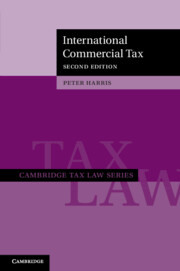Book contents
- International Commercial Tax
- Cambridge Tax Law
- International Commercial Tax
- Copyright page
- Contents
- Preface
- Abbreviations
- Introduction
- 1 Fundamentals and Sources of International Tax Law
- 2 The Jurisdiction to Tax
- 3 Source Country Taxation
- 4 Residence Country Taxation
- 5 The Limited Scope of Treaties
- 6 Changes of Source and Residence
- 7 Bilateral Administrative Issues
- Conclusion
- References
3 - Source Country Taxation
Published online by Cambridge University Press: 29 February 2020
- International Commercial Tax
- Cambridge Tax Law
- International Commercial Tax
- Copyright page
- Contents
- Preface
- Abbreviations
- Introduction
- 1 Fundamentals and Sources of International Tax Law
- 2 The Jurisdiction to Tax
- 3 Source Country Taxation
- 4 Residence Country Taxation
- 5 The Limited Scope of Treaties
- 6 Changes of Source and Residence
- 7 Bilateral Administrative Issues
- Conclusion
- References
Summary
Considers source country taxing rights under tax treaties. Initially follows the schedular approach of the OECD Model, the distributive provisions of which give source countries full taxing rights (immovable property, business, employment), limited taxing rights (dividends, interest) or no taxing rights (royalties, capital gains, other income). Source country rights, even if full, may be limited by treaty nondiscrimination provisions, which are compared to EU fundamental freedoms. Particular attention is devoted to taxation of business profits, including source country subsidiaries and permanent establishments. Problems inherent in the dual fictions of the authorised OECD approach to taxation of permanent establishments are noted. The second heading considers source country deductibility of payments made to non-residents. Deductibility of these payments can lead to base erosion while denying deductions raises issues of discrimination. The final heading first considers two fundamental features of payments that are critical for source country taxation; quantification and characterisation. Quantification raises issues of transfer pricing. Varying taxation based on characterisation raises issues of fungibility of payments, particularly in the definitions of ‘dividends’, ‘interest’ and ‘royalties’. These issues crossover in excessive interest payments and thin capitalisation. Finally, the chapter deals with reconciliation of provisions under the schedular approach.
Keywords
- Type
- Chapter
- Information
- International Commercial Tax , pp. 149 - 339Publisher: Cambridge University PressPrint publication year: 2020



